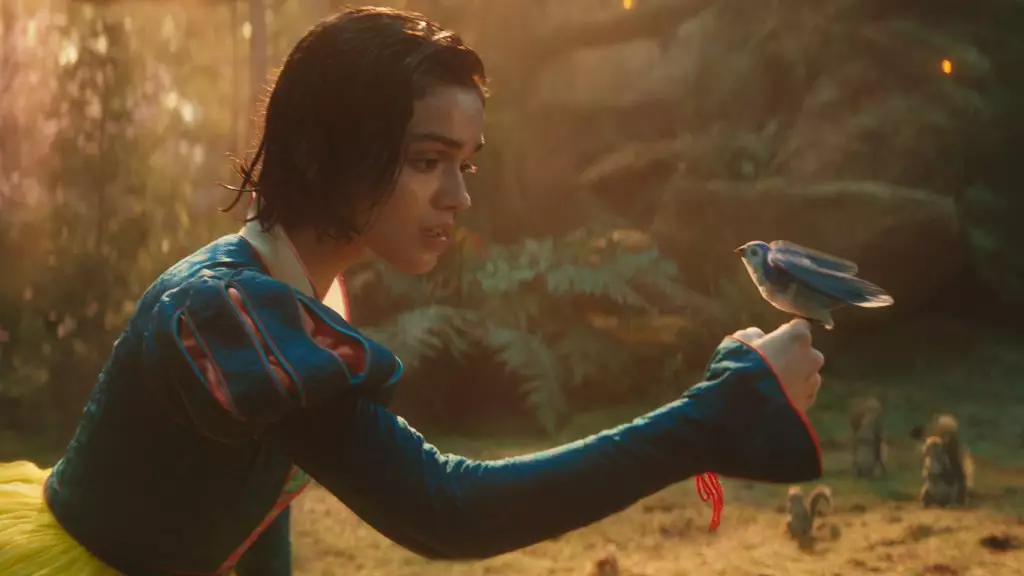As Disney gears up to unveil its live-action rendition of the 1937 animated classic Snow White, the film arrives draped in controversy and academic curiosity. With an astronomical production budget estimated at $270 million, this reimagining of the beloved tale has become a battleground for cultural discourse, fervently debated by critics and fans alike. The expectation for an opening weekend grossing between $45 to $50 million domestically, coupled with an additional $55 million overseas, speaks volumes about the industry’s desire for a blockbuster hit amidst a backdrop of adverse ticket sales largely influenced by social media narratives.
The choice of casting actress Rachel Zegler, a Latina of Polish descent, as the titular role has drawn ire from multiple corners. As debates on representation swirl, Zegler’s responses have often become as newsworthy as the film itself. Her candid critiques of the original works and scathing remarks directed towards political figures have escalated the situation, and one wonders if her forthrightness has inadvertently contributed to the film’s struggling presales. It’s evident that in a hyper-connected world, a single statement can have far-reaching repercussions, and social media has fueled a firestorm that puts this film squarely front and center in the culture wars.
The Implications of Social Response on Box Office Fate
The film waded into turbulent waters long before its general release; the industry’s relationship with social media is a complex tapestry that, when frayed, can impact ticket sales significantly. As evidenced by the buzz surrounding Snow White, we might be witnessing the tectonic shifts in audience engagement with cinema. While presales ticked above the $5 million mark—a figure that positions the film between the likes of Kung Fu Panda 4 and Dumbo—the overarching sentiment remains palpable: will the movie manage to find its audience amidst the noise?
The marketing strategy leading up to the premiere also raises eyebrows. The decision to forgo a traditional red-carpet event for mainstream press, despite organizing a festival-like pre-party, underscores the discontent Disney faces. It seems almost a calculated risk; while the allure of pre-party merriment is appealing, one can’t help but wonder if it’s a misstep in optics. Expecting families and young girls to ring the box office bell, Disney must navigate the patchy sentiment that has emerged in light of the film’s lead actresses’ public stances.
Piecing Together Audience Reception
Interestingly, the early demographic reports indicate interest particularly among familial audiences, especially in relation to young girls aged 6 to 16. This could provide a strategic avenue for Snow White to triumph at the box office, if the film manages to resonate with the core demographic. In the midst of these developments, the potential for creating a successful family film still exists, even bolstered by excitement around female-led narratives in an increasingly diverse media landscape.
The comparison with past Disney titles, such as Cinderella and The Little Mermaid, who faced their own controversies but ultimately soared in box office performance, leaves analysts pondering whether deep-seated social media narratives will hinder Snow White or become the very wind that fills its sails. Both films demonstrated that, amid initial skepticism, audiences are sometimes willing to put aside their differences when presented with an engaging story.
The Broader Cultural Context
Ultimately, Snow White stands as a microcosm of contemporary cultural battles between tradition and progress. Disney, in orchestrating this reimagining, finds itself under scrutiny not only for the narrative it wants to tell but also for its cultural implications. The backlash faced by Zegler showcases that discussions of representation are complex—there are voices advocating for inclusivity, while others call for authenticity in character portrayal, especially when drawing from classic tales steeped in particular lore.
At its essence, the film serves as an intriguing case study, not just from a cinematic perspective, but as a reflection of audience sentiment in a rapidly changing society. Disney’s foray into contentious territory is a gamble that could either reshape its legacy or reinforce existing fissures within its audience – revealing the unpredictable nature of contemporary pop culture today. Whether this gamble pays off at the box office or not could illuminate the trajectory of future films in this era overflowing with heated conversations around representation and identity.

